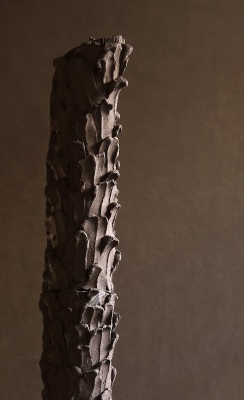Descripción de la Exposición
Anna Atkins, Harry Callahan, Pierpaolo Campanini, Mat Collishaw, Dorothy Cross, Latifa Echakhch, Susan Hartnett, Michael Landy, Mateo Lopez, Maria Sibylla Merian, Adrian Paci, Luisa Rabbia, Jeanne Silverthorne, Philip Taaffe, Emma Tennant, Michael John Whelan and Pae White
Curated by Allegra Pesenti.
Weeds are about survival in alien territory. Some grow in harsh and uninhabitable territories where one might think there was not enough soil to support any form of life, such as roadsides, ruins, rubbish dumps, construction sites and through cracks in exposed walls. It has been said that “in the struggle for existence a bad weed is a prince.” They can be toxic, deep-rooted and stubbornly hard to get rid of and they often appear where they are not wanted such as cultivated sites and manicured gardens. Depending on their properties, their ingestion can be deadly or resuscitating, and they have for centuries been variably concocted for the creation of both poisons and medicinal potions. Weeds have been described in myths and literary texts since at least the first century AD, from Pliny the Elder’s Natural History, through to Shakespeare’s descriptions of plants and potions, and on to writers of today such as Richard Mabey who recently published a bestseller on the subject. They have also sparked the interest of visual artists over time, and inspired works such as Dürer’s famous drawing The Great Piece of Turf and Leonardo da Vinci’s detailed sketches of wild tufts of grass. Today more than ever, weeds are appearing in works of art in various forms and mediums.
This exhibition explores the interpretation of weeds by contemporary artists within a socio-historical context. Elegant patterns of weeds and wildflowers in specimen books that date back to the eighteenth century belong to the fascinating intersection between science and art. Examples of these ancient manuscripts and collected specimens accompany the works of today in an eclectic but focused survey and a carefully orchestrated installation. The lush grounds and gardens of Lismore Castle form an integral and crucial part of the exhibition. Nourishment, Michael Landy’s portfolio of twelve etched ‘portraits’ of weeds, was one of the primary incentives for A Weed is a Plant Out of Place, and features in the gallery along with works by other contemporary artists. Vintage photographs by Anna Atkins and Harry Callahan are also included.
The underlying premise of the exhibition is the theme of migration. As their seeds set into the soles of travellers, or into the structures of ships and railroads, weeds follow the paths of migrants and resettle in distant environments across the globe. A poignant parallel can be made between the spread of these plants and human migration. Like weeds, immigrants seek to settle in foreign lands where they are often rejected, yet in which they blatantly resist a hostile and inhospitable environment to gather and replant their own roots. The subject of refugees and shifting populations is particularly critical in current times as we witness the desperate flight of North-African and Middle-Eastern men, women and children to the coasts of Italy and Greece for instance, or over the Turkish border. America has seen a similar influx from Latin America over the Mexican border, and there are constant shifts in migration throughout the African and Asian continents. Ireland too has its own history of dispossession. According to the New York Times, nearly 190 million people, about three percent of the world population, lived outside their country of birth in 2005. In the words of Edgar Anderson (1952): “the history of weeds is the history of man.”

Exposición. 17 abr de 2025 - 03 sep de 2025 / Centro Cultural Andratx (CCA) / Andratx, Baleares, España

Formación. 08 may de 2025 - 17 may de 2025 / Museo Nacional Centro de Arte Reina Sofía (MNCARS) / Madrid, España